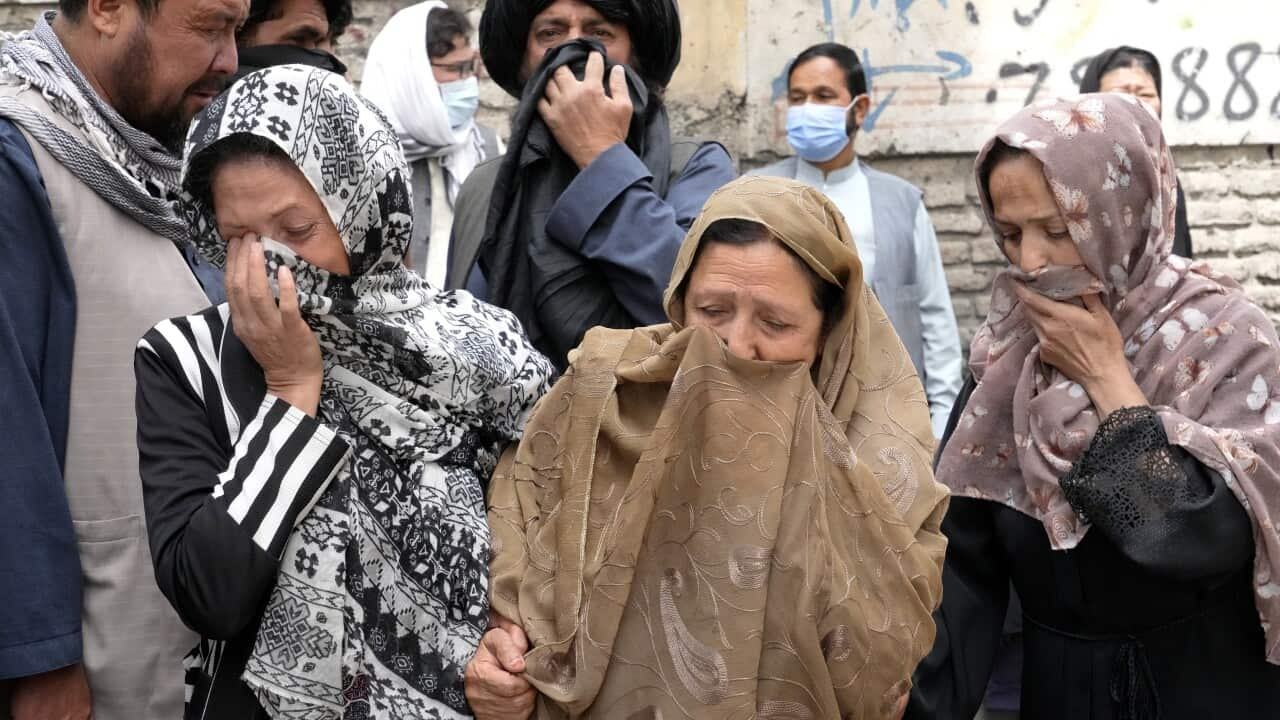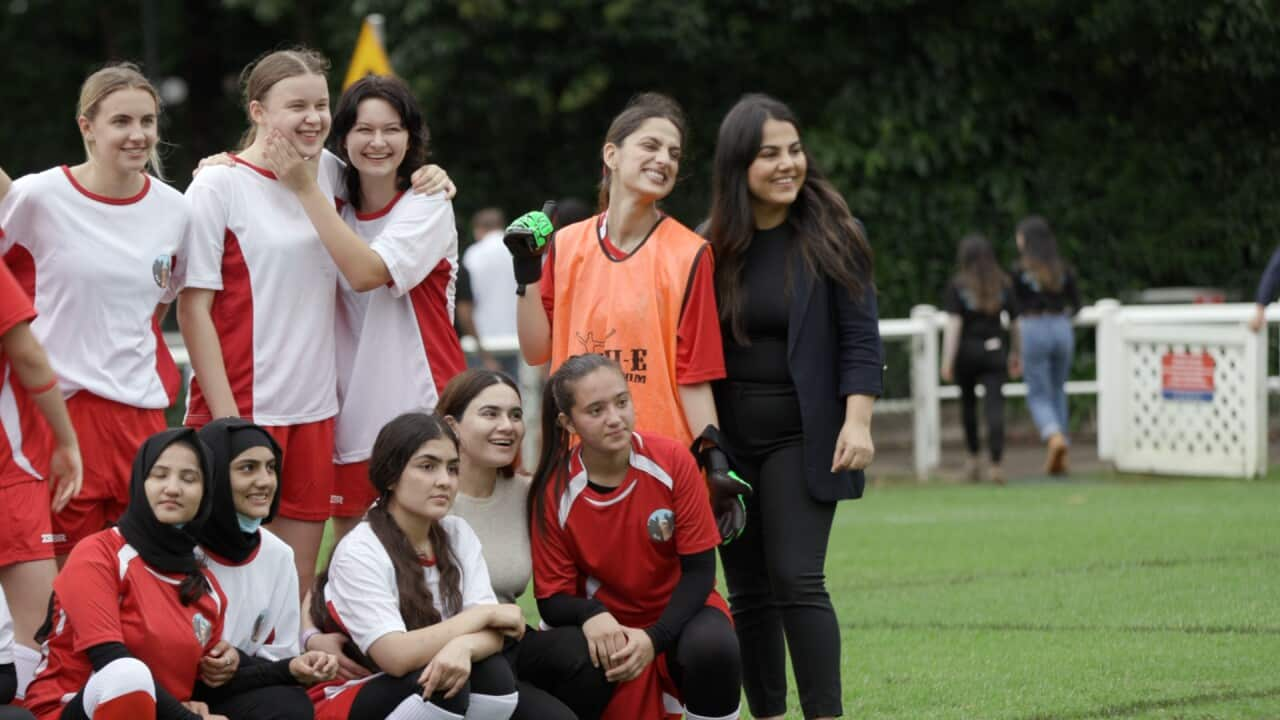

5 min read
This article is more than 2 years old
Why this women's football team aren't wearing their names on their shirts
After being evacuated from their homeland by Australia, players from Afghanistan’s national women’s football team have formed a new side and are making their debut in Melbourne.
Published 23 April 2022 7:27am
By Sean Wales
Source: SBS News
Image: Melbourne Victory’s Afghan Women’s Team. (SBS News / Sean Wales)
It’s while playing football with her friends that Mursal feels most connected to her homeland, even if in reality she’s thousands of kilometres away.
The 20-year-old fled Afghanistan in August fearing for her life, along with 30 other female footballers, as the Taliban’s takeover took hold.
Members of the country’s national women’s football team, as well as their coaches, were rescued as part of an evacuation operation by the Australian government, and on Sunday, the new-look team will make its debut in Australia.

Mursal, 19, was evacuated from Afghanistan by Australia. Source: SBS News / Sean Wales
The team is playing with the support of A-League club Melbourne Victory and its women’s championship-winning coach Jeff Hopkins. Their official name is Melbourne Victory’s Afghan Women’s Team and the team says it will represent Afghanistan "unofficially" for now.
This week they were presented with their new kits ahead of their first match in Victoria’s State League 4. The kit pays homage to their homeland; a red home shirt and white away shirt, with Afghanistan’s flag on the back.
But one typical feature is missing – their surnames.

Team captain, Fatima. Source: SBS News / Sean Wales
“It’s because of our identity; we want to protect our families,” captain Fatima says.
“I did play with my name before, and I was honoured to play with my own name and not to hide and be afraid.”
Some have been using their first names publicly during their time in Australia, while others have nicknames.
It’s because of our identity; we want to protect our families.Fatima, team captain
Some of the players’ family members were evacuated as part of the rescue missions, but many remain in Afghanistan and under threat from the Taliban.
Mursal remembers the chaotic scenes at Kabul airport, which made headlines around the world, as she tried to escape.
“It was such a bad day, we were outside and there was the Taliban – they’re such bad people,” she says, describing hearing gunshots all around her.
“I didn’t lose my hope. I tried once more [to get on a plane] and it was the best try. We spoke to an Australian soldier and he told us to wait and he would come and pick us up.
“We are so thankful Australia accepted us.”
Montaha, 19, came to Australia with her 15-year-old brother.
“I felt that I had lost my everything,” she says.
Just days ago, there was a bomb blast at a Kabul school not far from her home, where her parents remain.
“I just wish I had peace in my country, because I really miss my country,” she says.
“Just by playing sport my family life is in danger.”
Under its strict interpretation of Sharia law, the Taliban has previously banned women and girls from playing sport and attending school in Afghanistan.
“If you want to talk about sport in Afghanistan, it’s considered shocking. If you just talk about education, the Taliban will tell you it’s not good for women,” Montaha says.
“In the 21st century, it’s a horrible thing.”
Melbourne Victory’s managing director Caroline Carnegie says the club has welcomed the players with open arms after hearing their stories.
“When the Taliban took over again, women playing sport and playing football like these girls do, was dangerous and was banned.”
“We’re just privileged that we can be a part of it.”
The players have been assisted by refugee advocate and former Socceroo Craig Foster.
“I’m delighted they’re not just playing in Australia, but becoming a global symbol for women’s rights and the right to play sport, for not just Afghan women but women all around the world,” he says.
The team are currently in Australia on humanitarian visas and some players have their sights set on permanent residency.
“The first time I came here to Australia I finally felt that peace,” Fatima says.
“I never felt that before in my country. At home, every time I left my house I was so afraid of my life, afraid I wouldn’t go back home, wouldn’t see my family again.”
Fatima has travelled before with Afghanistan’s national team, so is accustomed to experiencing new cultures.
But while she would like to stay in Australia permanently, she says she will miss her family cheering her on from the sidelines.
“My family was my support, they were my backup.”
“My mum was supporting me so much in my life and especially in my football career. I will do whatever it takes to make her happy … I will do my best to [bring them here] too. You feel guilty because we got separated.”
She’s hopeful one day she and her teammates won’t have to hide who they are and their passion for football.
Until that day comes, it’s time to compete in their new home.
“I want to show that Afghan girls can do whatever they want,” Fatima says.
“We are all ready for the season – we want to win.”
Melbourne Victory’s Afghan Women’s Team plays ETA Buffalo Club Of Victoria at Delahey Reserve, Melbourne, at 11am on Sunday.
Would you like to share your story with SBS News? Email



